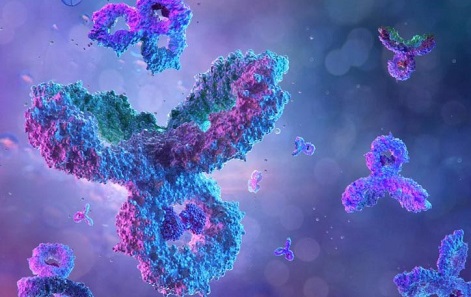Nikhil Prasad Fact checked by:Thailand Medical News Team Jul 20, 2024 9 months, 6 days, 6 hours ago
Medical News: Our immune system employs various strategies to protect us from harmful invaders like parasites, toxins, and even cancer. Among these strategies is the production of Immunoglobulin E (IgE) antibodies. While IgE plays a crucial role in defending against these threats, it can also cause significant issues when it reacts to common allergens. These reactions can lead to severe allergic responses, including anaphylaxis. This
Medical News report delves into the recent study by researchers from the University Hospital of Bern and University of Bern-Switzerland, comparing natural and therapeutic anti-IgE antibodies…shedding light on their roles in managing allergic conditions.
 New Insights into Allergy Treatments - IgE Antibodies
The Role of IgE in the Immune System
New Insights into Allergy Treatments - IgE Antibodies
The Role of IgE in the Immune System
IgE antibodies are produced by the immune system in response to allergens. When these allergens are detected, IgE binds to receptors on specific immune cells such as basophils and mast cells. This binding triggers the release of inflammatory substances, leading to symptoms of allergic reactions. However, not all IgE responses are harmful. In fact, IgE helps fight off parasites and other harmful agents. The problem arises when IgE reacts excessively to harmless substances like pollen or pet dander.
Natural Anti-IgE Antibodies: The Body's Built-in Regulation
Interestingly, our bodies produce natural anti-IgE autoantibodies, which circulate in healthy individuals. These autoantibodies help regulate the activity of IgE, preventing it from causing unnecessary allergic reactions. Recent studies have provided new insights into how these natural antibodies function. They appear to bind to IgE and block its interaction with receptors on immune cells, thus preventing the release of inflammatory substances.
Therapeutic Anti-IgE Antibodies: A Modern Medical Approach
In addition to natural anti-IgE antibodies, scientists have developed therapeutic monoclonal antibodies to treat severe allergic conditions. One of the most well-known therapeutic antibodies is omalizumab. Omalizumab works by binding to free IgE in the bloodstream, preventing it from attaching to receptors on immune cells. This action helps reduce the severity of allergic reactions in conditions like severe allergic asthma and chronic spontaneous urticaria.
Comparing Natural and Therapeutic Anti-IgE Antibodies
While both natural and therapeutic anti-IgE antibodies aim to regulate IgE activity, they operate differently. Natural antibodies are part of the body's immune system and are polyclonal, meaning they can target multiple sites on the IgE molecule. On the other hand, therapeutic antibodies like omalizumab are monoclonal, targeting a specific site on IgE. This specificity allows for a more controlled and predictable treatment outcome.
FcεRI and FcεRII: The Gatekeepers of Allergic Responses
IgE's effects are mediated through its interaction with two primary receptors: FcεRI and FcεRII (CD23).
FcεRI is found on the surface of mast cells and basophils, where it binds IgE with high affinity. When allergens cross-link IgE bound to FcεRI, it triggers the release of histamine and other inflammatory mediators, causing allergic symptoms. FcεRII, on the other hand, is found on a broader range of cells and has a lower affinity for IgE. It plays a role in regulating IgE synthesis and clearing IgE from the bloodstream.
The Role of Glycosylation in IgE Function
One of the key discoveries in recent years is the role of glycosylation in IgE function. Glycosylation refers to the addition of sugar molecules to proteins, which can significantly impact their behavior. For IgE, specific glycosylation sites are crucial for its binding to receptors. Natural anti-IgE antibodies often target these glycosylation sites, preventing IgE from binding to FcεRI and triggering allergic responses.
Omalizumab: A Game-Changer in Allergy Treatment
Omalizumab has revolutionized the treatment of severe allergic conditions. By binding to free IgE, it prevents IgE from interacting with its receptors, thereby reducing allergic inflammation. This makes omalizumab effective in treating conditions like severe allergic asthma, chronic spontaneous urticaria, and nasal polyps. Moreover, recent studies suggest that omalizumab may also be beneficial in treating food allergies and autoimmune diseases such as systemic lupus erythematosus.
Emerging Alternatives to Omalizumab
Despite the success of omalizumab, researchers are exploring other monoclonal antibodies that could offer additional benefits. Ligelizumab and UB-221 are two promising candidates. Ligelizumab has shown higher affinity for IgE and may be more effective in certain allergic conditions. UB-221, distinct from both omalizumab and ligelizumab, allows for the interaction of IgE with CD23, potentially enhancing its ability to clear IgE from the serum.
The Mysterious Role of Natural Anti-IgE Autoantibodies
Natural anti-IgE autoantibodies have been a topic of intrigue for researchers. While these antibodies are found in healthy individuals, their exact role remains unclear. Some studies suggest that they can trigger allergic responses under certain conditions, while others indicate they act as negative regulators of IgE activity. Recent findings highlight the importance of IgE glycosylation in determining the behavior of these natural antibodies.
Potential for Anti-IgE Vaccines
Building on the knowledge of natural anti-IgE antibodies, researchers are exploring the development of vaccines that could induce similar protective effects. These vaccines aim to generate antibodies that target IgE, thereby reducing allergic reactions without the need for continuous medication. Early studies in mice have shown promising results, with reduced IgE levels and allergy symptoms following vaccination.
Conclusion
In summary, the study of natural and therapeutic anti-IgE antibodies offers valuable insights into managing allergic conditions. While therapeutic antibodies like omalizumab have significantly improved treatment outcomes, understanding the role of natural antibodies could lead to even more effective therapies. The ongoing research into glycosylation and the development of anti-IgE vaccines holds promise for the future of allergy treatment.
The study findings were published in the peer-reviewed journal: Antibodies.
https://www.mdpi.com/2073-4468/13/3/58
For the latest on Allergies and IgE Antibodies, keep on logging to Thailand
Medical News.
Read Also:
https://www.thailandmedical.news/news/allergies-in-children-prevalence,-symptoms,-and-management-strategies
https://www.thailandmedical.news/news/how-to-store-your-allergy-meds
